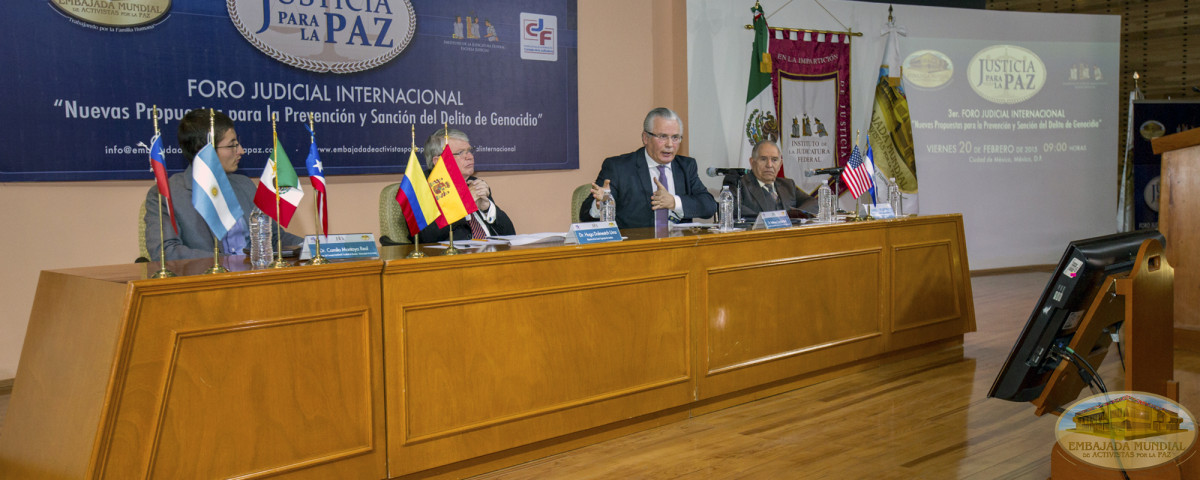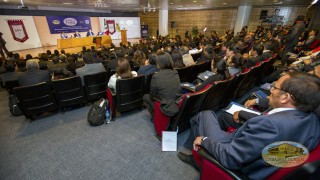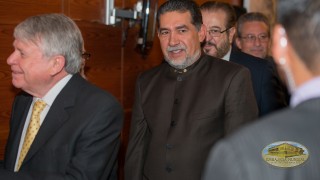Context of International Crimes of the Second Table of the International Judicial Forum, Mexico 2015
Spain, Colombia and Chile
CONTEXT OF INTERNATIONAL CRIMES OF THE SECOND TABLE OF THE INTERNATIONAL JUDICIAL FORUM, MEXICO 2015.
With the moderation of the important Mexican judge, Dr. Jose Antonio Murguia Rosete, president of the International Law Seminar of the UNAM, the second table of the International Judicial Forum in Mexico was assembled, with the participation of a renowned judge from Spain and president of the FIBGAR Foundation Dr. Baltazar Garzon; a student from the Universidad de los Andes of Colombia, Camilo Montoya Real; and Dr. Hugo Dolmestch Urra, Minister of the Supreme Court of Justice of Chile.
Dr. Jose Antonio Murgia introduced this table stating that:
“To find a solution and a way to move public opinion to support a series of actions and prevent international crimes from proliferating, is one of the goals that, up until now, has been unobtainable. But, we hope that with perseverance, and with the work of people like yourselves, we will be able to reach it.”
 Lecturing on the topic “The Universal Jurisdiction as an instrument against the Crime of Genocide and other International Crimes” was Dr. Baltazar Garzon from Spain. Internationally known for his investigation on cases related to heinous crimes, Dr. Garzon spoke on the importance of defining Justice and Universal Jurisdiction, which “…involves an international and universal perspective while investigating these crimes. In other words, disregarding the place where the crime took place, the nationality of the victims or the offenders, and provided that there are some limitations such as not investigating these crimes in the country in which they were committed.” This was the base of his dissertation, on a very current context in which humanity is living today, pointing out different armed conflicts and other crimes that are being carried out before our eyes.
Lecturing on the topic “The Universal Jurisdiction as an instrument against the Crime of Genocide and other International Crimes” was Dr. Baltazar Garzon from Spain. Internationally known for his investigation on cases related to heinous crimes, Dr. Garzon spoke on the importance of defining Justice and Universal Jurisdiction, which “…involves an international and universal perspective while investigating these crimes. In other words, disregarding the place where the crime took place, the nationality of the victims or the offenders, and provided that there are some limitations such as not investigating these crimes in the country in which they were committed.” This was the base of his dissertation, on a very current context in which humanity is living today, pointing out different armed conflicts and other crimes that are being carried out before our eyes.
Speaking on the importance of youth and student participation in the construction of Peace, Camilo Montoya Real, a student of the Universidad de los Andes of Colombia, with his topic: “The Student Movement: Ground for the Seed of Peace”. He recalled the various proposals that have been made to promote the participation of students, especially law students, in topics related to discrimination and tolerance, and pointed out the importance of encouraging these types of movements in the educational field, and aim to enrich student life, and to ensure that the community has the ability to access opportunities for citizen participation, initiatives and projects with objectives in political dialogue and politics, respecting ideological differences.
The last lecturer of this table was Dr. Hugo Dolmestch Urra from Chile, who, with a broad and distinguished record in the field of Human Rights, is convinced that these aberrations against humanity are conceived, born and developed during dictatorships. He further noted that:
“In general, Latin American countries have yet to assume, in many cases, have not even foreseen a culture of human rights, considered individually or as governments and institutions.”
This table concluded with the insightful words of Dr. Jose Antonio Murguia Rosete, moderator of this second section of the International Judicial Forum, Mexico 2015:
“We need the respect for human rights, the respect for international life to be fulfilled, but to be integrally fulfilled by everyone. It is a long road, but we are willing to take it.”



